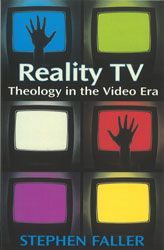
Chalice Press, 2009
RRP $32.95
Reviewed by Karyl Davison.
LOVE them or hate them, reality TV shows make up a huge proportion of television broadcasts in Australia today.
There is little doubt that some reality TV is appalling, exposing its participants in experiences that are at best morally dubious and at worst, psychologically damaging.
Like so many other things in our culture, we can choose to ignore reality TV or we can join the conversation about what has become a global phenomenon.
Why might it be important to join the conversation?
Firstly, reality TV has captured the imagination of our cultures and, we have to assume, it holds some meaning to the people who watch it.
At its most basic level reality TV is based on human experience – people discovering who they are, or being somehow transformed.
Many reality programs are built of relationships and community, albeit engineered relationships and community.
Secondly, they explore some themes that are vitally important to us, and have obvious spiritual resonance, such as rejection and damnation, paradise and salvation, and reward or punishment and how people behave in the face of winners and losers.
However Reality TV is a fairly superficial treatment of this phenomenon.
Faller does not attempt to address the broader social implications of reality TV and the accompanying ramifications of a culture of celebrity. It certainly doesn’t expose reality TVs underbelly – humiliation, weakness, betrayal and unfettered self-seeking.
We do need theological engagement with this prominent part of the world around us and this is a good start.
However I will be looking for one which deals much more comprehensively with reality TV, the medium itself and the extent to which it forms and shapes our cultural lives.
 JourneyOnline
JourneyOnline






